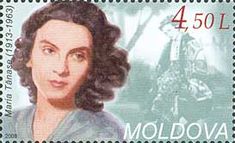- Maria Tănase
-
Maria Tănase (Romanian pronunciation: [maˈri.a təˈnase]; 25 September 1913 – 22 June 1963) was a renowned Romanian singer of Romanian traditional or non-contemporary folk music.
Contents
Biography
Born in the Bucharest suburb of Cărămidari, Maria Tănase's Primary School was nr. 11 Tăbăcari. She made her stage debut in Cărămidarii de Jos, at the Ion Heliade Rădulescu High School. In 1934, she joined the Cărăbuş Theatre of Constantin Tănase with the help and advice of newspaper writer Sandu Eliad, who, at the time was her partner.[1] Her debut proper took place on June 2, 1937 with the stage name of Mary Atanasiu in the musical hall theatres, Alhambra and Gioconda. She represented Romania at the International Exhibition in Paris in 1937, as well as at the 1939 New York World's Fair. During World War II, together with George Enescu, George Vraca and Constantin Tănase, she performed in a series of shows for soldiers injured on the battlefield.
On February 20, 1938[2] she made her radio debut. Fame came shortly afterwards, as, during the same year, she made her first recordings for the Romanian Radio Society. These early recordings are said to have been destroyed by the "authorities" during the first months of the National Legionary State, at a time when Maria Tănase had also been banned from performing in public.[3]
In December 1943, she sang at the Christmas festivities at the Royal Cavalry Regiment, where King Michael I of Romania, Ion Antonescu, Mihai Antonescu and all the members of the government were present as guests. After World War II, she performed in the Review Ensemble and the Satirical and Musical Theatre Constantin Tănase. She had parts in the plays "The Living Corpse" by Leo Tolstoy in 1945, and "Horia" by Mihai Davidoglu in 1956. In 1944 Maria Tănase sang in Edmond Audran's operetta "Mascota" (The Mascot). In 1946 she held the main part in the musical comedy "The Hollywood Sphinx", by Ralph Benatzky. She sang in the movie "Romania" in 1947, and in 1958 she performed in both "Ciulinii Bărăganului" (The Thistles of the Bărăgan), and the short-reel film "Amintiri din Bucureşti" (Memories from Bucharest). In 1952, Maria Tănase was offered a position at the Music School No. 1 in Bucharest, in the newly created folk song department; 1962 found her guiding "Taraful Gorjului" (The Gorj Folk Music Band) in Târgu Jiu and the artists there, at her own request. On May 1, 1963, after a concert in Hunedoara, she was forced, because of illness to abort her tours.
In 1955, she received the State Prize and in 1957 she was honored with the medals "Ordinul Muncii" (The Order for Activity), "Premiul de Stat" (The State Award), and the title "Artistă Emerită" (Honoured Artist of the Republic) for her contributions to the arts.
She toured many times in the last 15 years of her life, including over forty trips to New York City. She died of cancer on June 22, 1963 and is buried at the Bellu cemetery in Bucharest, Romania.
Year Title Label 1957 "IV" Electrecord 1994 "Greatest Hits" Electrecord 1994 "Maria Tanase (24 Works)" Electrecord 2001 "Ciuleandra" Oriente Musik 2000 "Malediction d'Amour" Oriente Musik 2002 "Magic Bird (The Early Years)" Oriente Musik "Maria Tănase Volume I" Electrecord "Maria Tănase Volume II" Electrecord "Maria Tănase Volume III" Electrecord Notes
The character of Floricica in the first novel of Olivia Manning's Fortunes of War trilogy is supposed to have been based upon Maria Tănase.[4]
References
- ^ Maria Roşca, "Maria Tănase", p. 35, Editura Muzicală, Bucureşti, 1988
- ^ Maria Roşca, "Maria Tănase", p. 38-43, Editura Muzicală, Bucureşti, 1988
- ^ Maria Roşca, "Maria Tănase", p. 89, Editura Muzicală, Bucureşti, 1988
- ^ Carmen Andraş, "Olivia Manning şi Bucureştiul interbelic - Auto-cenzura ideologică şi/sau afectivă", Centrul de cercetare a imaginarului.
Further reading
- Ghiaţă, Petre; Sachelarie, Clery (1966) (in Romanian). Maria Tănase şi cîntecul românesc (2nd ed.). Bucureşti: Editura Muzicală a Uniunii Compozitorilor din R.S. România.
- Michailescu, Gaby (2003) (in Romanian). Maria cea fără de moarte. Cluj Napoca: Eikon. ISBN 9738647002.
- Nedelcea, Tudor (1999) (in Romanian). Pasărea măiastră (2nd ed.). Craiova: Scrisul Românesc. ISBN 9739901395.
- Roşca, Maria (2000) (in Romanian). Maria Tănase, privighetoarea din Livada cu Duzi. 2 volumes. Ginta Latină.
- Roşca, Maria (1988) (in Romanian). Maria Tănase. Bucureşti: Editura Muzicală.
- Sbârcea, George (1991) (in Romanian). Maria Tănase, pasărea măiastră a cântecului românesc, îşi povesteşte viaţa lui George Sbârcea. Romhelion. ISBN 9739052045.
External links
Categories:- Romanian female singers
- Romanian cabaret performers
- People from Bucharest
- Romanian people of World War II
- Cancer deaths in Romania
- Burials at Bellu
- 1913 births
- 1963 deaths
Wikimedia Foundation. 2010.


